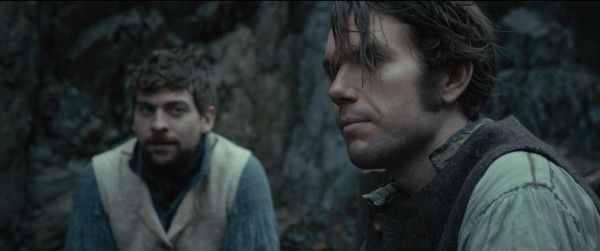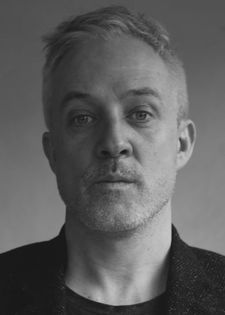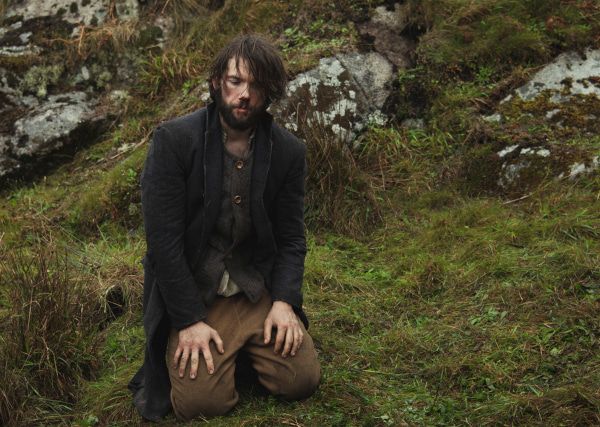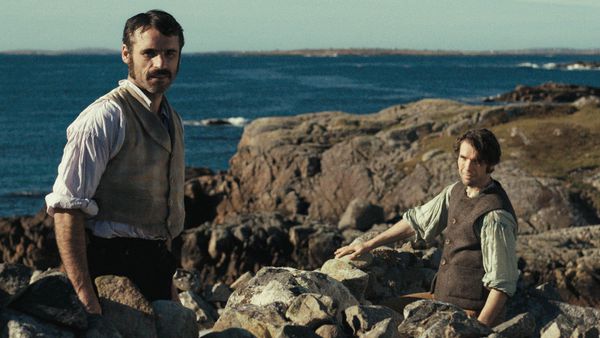 |
| Dónall Ó Héalai, right, with Eoin O Dubhghaill. Tom Sullivan on Héalai: 'He nailed it physically and that just raised the bar for everybody, including myself' Photo: Courtesy of Tallinn Black Nights |
Shot in the Irish language - and you can read more of what Sullivan told me about the scheme that developed it here - it's a moody and elegant film that sees the actor-turned-writer/director step up from shorts to features.
 |
| Director Tom Sullivan: 'Pace is the most important thing when you're writing and when you're shooting' |
"I think it's the way the human brain works. I think we're able to retain maybe a 15 to 20 minute story but when it gets anything beyond that you get lost. The landscape, well, you need a road map. So that was a massive learning curve - how to manage the size of it in terms of the narrative and writing the script. I would say, after doing it, it's almost a different medium to anything else I've done. The shorts, the TV, they don't compare. It's the same nuts and bolts but in terms of the big picture it's totally different. So, I've learned a massive amount doing it and I'm really looking forward to doing another one."
The film has a wintry mood and involves Ó Héalai spending a fair amount of time in a boat - and getting in the sea half-naked. "I really felt for them, they were cold a lot of the time," says Sullivan. "Dónall did a lot of acclimatising. He's from back there and he was swimming in the sea for a month before in the cold water."
He adds: "We shot in October and we had 21 days to shoot it. We had a few storms. The weather was very much part of the story, so it was a bit foolhardy of us, to be honest with you, to go in when we did. But the gods were absolutely on our side. We got storms when we needed them, we got rough weather when we needed it. And there was one particular day when we had scheduled to shoot a lot of the things around the house at the beginning of the film, in terms of pre-famine and, obviously, my intention was to show Ireland in its bountiful state in the summertime, because the blight kicked in at harvest time. I'm telling you it was weird because it's happened to me on other things - I just knew we were going to be all right in terms of that. The funny thing about Ireland is they say, especially in the west: 'If you don't like the weather, wait ten minutes'.
 |
| Dónall Ó Héalai as Colmán. Tom Sullivan on the Great Famine: 'I think it's a conversation we're ready to have now' Photo: Courtesy of Tallinn Black Nights |
Ó Héalai's commitment to his character went above and beyond the swimming in the sea.
"He dropped four stone for the part in four months," says Sullivan. "The amount of weight he lost and the way he looks in the film is absolutely perfect. He could have gone Machinist - we had a talk about that and he wasn't far away from that - but I always said, "No, you need to believe that this guy can row in and out from this island. That he can survive and that he can fish. He can't be skin and bones.
"So he nailed it physically and that just raised the bar for everybody, including myself. It's wonderful when you've got someone who is that committed and has sacrificed so much on set, all the other arguments that come up on set just die away very quickly when you say, 'You really think I'm going to tell a guy who's just starved himself for four months that we can't shoot this now because the roof isn't ready.' They all got it immediately.
"We shot the skinny stuff first. Then he had to go on it. At noon on about day 10, he could start eating again for the first time in four months - and, man, did he eat. I was living with him and he put on two stone in a week. I'd be upstairs and I'd hear him going, "Aaah." I'd say, "What's wrong Dónall?" and he'd say, "I've eaten too much." But laughing as well, he loved to be able to gorge."
Quite often first features can feel overstuffed - as though the directors fear they will never get the chance to make another one - but Sullivan's film is restrained, putting the emphasis on mood and character rather than overcomplicating the plot. Sullivan singles out his producer Cúán Mac Conghail for praise and also says that he is very aware of pacing when he's writing.
He adds: "That's something that I've learned from other friends of mine who direct and who keep telling me pace is the most important thing when you're writing and when you're shooting - that you're aware of it. So that you're aware of what just happened and what the audience need now - they need to relax for a second or you need to drop it out. But you can't drop it out for too long or it starts to sag and that is something that I was aware of when I was writing.
"What happened to the film was, and I'd say this is quite common, it was a 90-page film when we went to shoot. But when we went to wrestle with the budget, we knew we had to shoot it on the west coast of Ireland and bring everybody over there, money became very tight very quickly and we realised that we weren't going to be able to shoot a 90-page film in four weeks. So, we had to cut it down and the end script was 73 pages. So we lost a lot of what I would have probably thrown into my first feature. I think that helped in a weird way. I think that added to the sparseness of it. But I do think stuff was lost that, when I look at the film, I think would have helped.
"I'm always aware of the audience in terms of pace and all that stuff. My biggest fear would be that my films would ever bore anybody because that's unforgivable."
The Great Famine, which lasted from 1845 to 1849, devastated communities and saw the population of Ireland fall by about 20 to 25 per cent due to death and emigration. But it's only recently that it seems to be talked about more in terms of cinema and art, with films like Lance Daly's Black '47 last year and now Arracht. Sullivan says he thinks a lot of artists and filmmakers have been "frightened of the famine because it's hallowed ground", noting that when he told Sing Street director John Carney about what he was making, he told him "You better nail it, be careful".
He adds: "Black 47 is set in the same time - it's a very good film but very different. When I was doing the research and writing this brilliant travelling exhibition about famine art came to Ireland. It really seemed like things were starting to happen in terms of the famine. A few fiction books came out and a really good singer-songwriter Declan O'Rourke released an album of contemporary famine songs. I think it's a conversation we're ready to have now."
Arracht is just beginning its festival journey, but Sullivan is already working on new projects. "I'm writing a dark comedy set in the 80s in Dublin, around the time of the Chernobyl disaster, about a kid who's obsessed with it and an ex-con who loses the family pet and these two are brought together through a case of mistaken doggy identity. It's kind of a family story, dark comedy - a bit Withnail & I a bit Intermission. It's called Sonny."
I note that it's another child and adult story and wonder if that's something that Sullivan finds himself drawn to?
 |
| Dara Devaney and Dónall Ó Héalai in Arracht. Tom Sullivan: 'My biggest fear would be that my films would ever bore anybody because that's unforgivable' Photo: Courtesy of Tallinn Black Nights |
"Absolutely, because I'm working on another project that will probably go in for funding from this scheme - it'll be an Irish language production. And it's set in the west of Ireland and is about a woman who is pariah in the town. She works on the boats just like Colmán but it's contemporary. She's a seaweed harvester and she lives very much in a male world looking after her father but they don't get on.
"There's a direct provision centre in the town - which is a big thing in Ireland right now, it's where refugees are put and it's quite controversial because the majority of Ireland feel that it's badly done. The government are just filling these hotels with refugees without consulting or liaising with the community, which is creating a lot of tension, which is really unfortunate. So, there's a direct provision hotel in this town and there's an African community living there who are not allowed to work so they pick periwinkles. One day, she witnesses a little African child fall in the water and she saves him from drowning and this begins a relationship with the child and her mother. Then the dark past of why she is a pariah begins to reveal itself.
"I think I'm very influenced by things like The Road or True Grit and I have a young son now and I think that's part of it. What he's given to me and what I've learned from him has been inspirational in terms of my growth. I think children have a remarkable power to heal us."





















